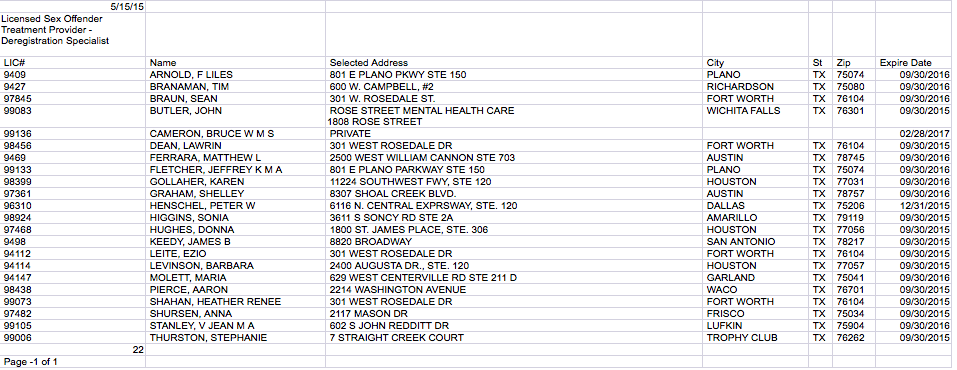Under the Texas Sex Offender Deregistration law, if you are required to register under the sex offender registration program, you may be eligible to deregister after a minimum required registration period.
We have successfully deregistered dozens of people in Texas since 2015!
TEXAS SEX OFFENDER DEREGISTRATION ATTORNEY FAQs
- How do I know if I qualify for early termination of my obligation to register?
- How do I apply for deregistration / early termination?
- Who does the risk assessment for sex offender deregistration?
- Are there any other ways to deregister from sex offender registration requirements?
- What are the effects of deregistration / early termination?
Your early termination eligibility depends on whether the registrable offense meets certain criteria, as described below. In addition, there are certain procedures you must follow. If you are eligible, then you must ultimately obtain an order granting early termination from a judge. You will need to hire a lawyer to help you with the sex offender deregistration process.
DPS released a new Tiered Offense List in September 2022, providing a new opportunity for analysis of early termination of registration obligations
In the state of Texas, many people convicted of sex crimes must register as a sex offender. The ramifications of this registration can be and often are catastrophic to the normal daily functions of life. For many people sex offender registration has resulted in limited employment opportunities, difficult residency restrictions, harassment, social isolation, and just the general negative stigma of being a registered sex offender.
In addition, there are court mandated consequences. Specifically, you will be required to continue to regularly register as a sex offender in Texas for the prescribed period. Depending on the specific offense, a failure to meet this duty to register can range from a state jail felony, with a maximum of 2 years in state jail, up to a second degree felony with a maximum imprisonment of 20 years.
The Texas sex offender deregistration process has only been available since 2005, when the Texas legislature enacted House Bill 867. For the first time, the new law allowed for the early termination of the requirement for an individual to register as a sex offender in the State of Texas.
Interested in Sex Offender Deregistration in Texas? Contact us today to discuss legal representation.
or Text or Call (888) 239-9305
How do I know if I qualify for early termination of my obligation to register?
In order to qualify for early termination of Texas sex offender registration, you must meet certain eligibility criteria.
Initial Eligibility Determination
For starters, you may have only one single reportable adjudication or conviction. The offense must require sex offender registration under Texas CCP Chapter 62 for a period that exceeds the minimum required registration period under federal law.[1] The offense must appear on the CSOT list of all eligible offenses found on the the DPS website. A strict reading of the statute reveals that if the offense is not on that list, then it does not qualify, even if it technically requires registration for a period that exceeds the minimum required registration period under federal law[2]
Complicating things, however, federal law does not mirror Texas state law, and so certain offenses may sometimes qualify and sometimes not qualify, depending on the circumstances of the particular conviction or adjudication. In addition, the law requires CSOT to update the DPS tiered offense list regularly,[3] but the list is not perfectly accurate. As a result, the eligible offenses list will continue to change.
The DES Evaluation and Risk Assessment
If your offense is eligible, then you do not automatically qualify for early termination. However, after the initial eligibility determination by CSOT, you may proceed to the next step – the DES evaluation and risk assessment. You must undergo the specific authorized DES evaluation in order to qualify for early termination.[4] You must also pay for the costs of the evaluation.[5]
The Motion for Early Termination & Court Hearing
Finally, you must obtain an Order Granting Early Termination from a judge.[6] In order to obtain the order, you must submit a Motion for Early Termination to the judge, and with this motion you must also file a certified copy of the report on the outcome of the risk assessment to the court in addition to a written explanation of the offense eligibility as described above.[7] Once you have filed all of this, you will need to convince the court to grant you a hearing ad sign the Order Granting Early Termination.[8]
How do I apply for deregistration / early termination?
The CSOT Application for a Deregistration Evaluation
The deregistration process begins by compiling the documents necessary to apply for a deregistration evaluation. Only certain highly specialized individuals may give this evaluation, and it requires a special license from the Council on Sex Offender Treatment (the “CSOT”).
Deregistration Evaluation Specialists (a “DES”) give these special evaluations. A DES can only evaluate you after the CSOT has approved you to be evaluated. Once you have obtained the necessary documents, you can apply for this approval. The application requires multiple background checks, copies of court orders, a filing fee, and additional court documents if the crime involved a minor. If appropriate, an applicant may also include a letter confirming completion of sex offender treatment or a copy of an order stating they were successfully discharged from community supervision or parole.
The Initial Eligibility Check & Deregistration Evaluation
The CSOT will review your application and supporting documents and determine whether your offense qualifies for deregistration. If they determine that it does, then they will approve you for the evaluation and send you a letter authorizing you to be evaluated.
You can then take that letter to a DES to conduct the evaluation. The DES will then send the results of the evaluation to the CSOT.
Filing the Motion for Early Termination in Court
The CSOT will review the results from the DES evaluation and ultimately send you a letter confirming whether or not you may file a motion with the court. If the CSOT approves you to file the motion, you will need to prepare the motion and order, serve the state, schedule a hearing, subpoena witnesses and finally, convince the judge at the hearing to grant the motion.
You must file the motion for early termination in the trial court that sentenced that person for the reportable conviction or adjudication.[9] The filing must include a certified copy of the report on the outcome of the DES evaluation in addition to a written explanation of the offense eligibility as described above.[10]
Who does the risk assessment for sex offender deregistration?
The sex offender deregistration law in Texas tasks the Council on Sex Offender Treatment with performing the risk assessments.[11] However, the Council is authorized to contract with independent, licensed sex offender treatment providers to perform deregistration evaluations.[12] The Council, in practice, does enter into these contracts, and it provides a list of authorized providers.

The assessment is supposed to evaluate a person’s criminal history, predict the likelihood of further criminal activity and determine the continuing danger the person poses to the community.[13] After conducting the evaluation, the deregistration specialist will send a written report with their conclusions to the Texas Council of Sex Offender Treatment.[14]
Are there any other ways to deregister from sex offender registration requirements?
You may be eligible to petition the court for a registration exemption if you are registrable because of an Indecency with a Child offense or a Sexual Assault offense and, (1) at the time of the offense, you were not more than four years older than the victim or intended victim and the victim or intended victim was at least 15 years of age and (2) the conviction is based solely on the ages of the defendant and the victim or intended victim at the time of the offense. Specifically, you may only have one single reportable adjudication or conviction, the victim was at least 15 years old, the defendant was not more than 4 years older than the victim, and the charges are based solely on the ages of the parties.[15]
Texas Code of Criminal Procedure Article 62.301 describes a process to petition a court for an exemption to register if you qualify as described above. If you are eligible, then you may petition the court and the court may grant you a hearing.[16] If the court grants your petition, then the judge will issue an order exempting you from registration.[17] An order exempting you from registration does not expire but the court is required to withdraw the order if you receive a subsequent reportable conviction or adjudication.[18]
What are the effects of deregistration / early termination?
A person who has been granted early termination in Texas would no longer need to register in Texas.[19] All conditions relating to this duty to register will be modified on then person’s parole, release to mandatory supervision, or community supervision to reflect the court’s order.[20] However, successful deregistration does not destroy or remove criminal case records. Deregistration only removes your name from the Texas Sex Offender Registry database and removes your legal requirement to continue to register on a public sex offender database. Learn more about clearing your record
When you are ready to apply for sex offender deregistration in Texas, call us or book a consultation today.
Legal References:
^1. Texas Code of Criminal Procedure §62.403(b) – 62.403(b) cross-references 62.402(b), which describes the requirement for the Council on Sex Offender Treatment to list all offenses where the registration period is longer than the registration period required under federal law.^2. Code of Criminal Procedure §62.403(b)^3. Texas CCP §62.402(c)^4. Texas Code of Criminal Procedure §62.404(a)^5. Code of Criminal Procedure §62.406^6. Texas Code of Criminal Procedure §62.407(a)^7. Texas Code of Criminal Procedure §62.404^8. Code of Criminal Procedure §62.405(a)^9. Texas Code of Criminal Procedure §62.404(a)^10. Code of Criminal Procedure §62.404(a)(1)&2^11. Texas Code of Criminal Procedure §62.403(b)^13. Code of Criminal Procedure §62.403(a)(1)&(2)^15. This language comes from CCP Sections 42.017 and 42A.105. CCP §62.301 describes the offenses listed under that section as the determining factor in whether a person may file a petition for exemption under Article 62.301.^16. Texas CCP §62.30162.301(a)&(c)^17. Code of Criminal Procedure §62.301(d)^18. Texas CCP §62.301(e)^19. Code of Criminal Procedure §§62.407(a)^20. Texas CCP §62.407(b)










